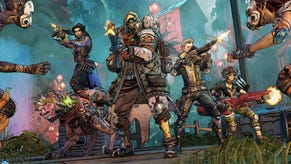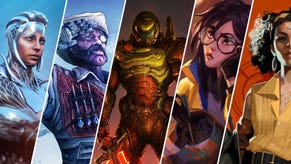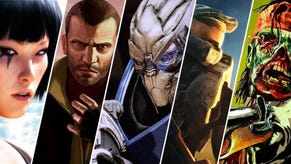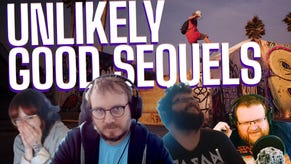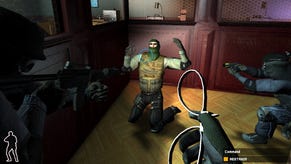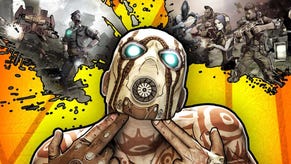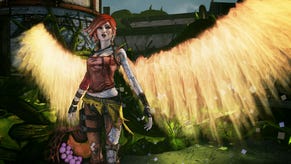Nobody does it better: why I'm psyched for Borderlands 2
Cry "sequelitis" if you like, but Borderlands 2 is one follow-up Brenna Hillier is happy to see take an uncontested crown from its precursor.
Tapping into the venn diagram of people who enjoy the skill of action-based gameplay and the unique results of loot-drop RPG character progression was a genius move of Gearbox’s, and one which is yet to be topped. Even if Borderlands had been as dull and dry as the desert it's set in, it would still be one of if not the best example of shooter RPG mechanics available today.
Borderlands hasn't aged as well as it might have. Fire it up today, not quite three years on, and it feels surprisingly dated; not at all the slick experience I remember. Trying to get a co-op session happening with Pat recently, for example, I was horrified to discover the PC version used Gamespy's matchmaking system - what is this, 2003? The netcode doesn't stand up to the continental divide between two of VG247's offices as well as other games of the same era do. The cartoon stylings have mostly stood the test of time, but my beast of a gaming PC can't do anything to iron out the game's jitters, and all the old frustrations with endless fetch quests came flooding right back.
But warts and all, it's still a formula I'd sit up to 2.00am with, and one I'm absolutely psyched to see it grow and develop when Borderlands 2 releases in September. I know I'm not alone. In mid-2009, writing positively about Borderlands - its unusual cel-shaded aesthetic, planned open-world gameplay, and strange blend of RPG and co-op shooter mechanics - was a dangerous occupation; cynical audiences didn't want to hear a whiff of it from the team behind the increasingly disappointing Brothers in Arms series. Just a few months later expressing any scorn for Gearbox's epic was like putting your hand in a blender. Gamers got their grubby little paws on this left-field smash hit and fell wildly and in love with its weird little world, forgetting all their earlier concerns and already raving about what Gearbox might do next.
Borderlands had sold over 4.5 million units as of late 2011, and is Gearbox's most critically-acclaimed effort so far, with a Metacritic of 81-84; the Xbox 360 version is ranked most highly. It snagged a number of press awards, sold a bucketload of DLC, and of course, secured the upcoming sequel.
These are significant achievements for a new property, especially half way through a generation's lifespan, and Borderlands owes its success to daring to be different. Shooter RPGs are pretty thin on the ground; although all the big multiplayer shooters have embraced class levelling, very few offer the customisation and flexibility (and arguably, entrancing loot cycle) of a real RPG. The first example to spring to mind is the original, by then nearly decade-old Deus Ex, which had enough of its own problems to make some people swear off the genre-blend forever.
Borderlands proved the formula could really work, but since its release, almost nothing else has tried to step into its shoes. Again, there's Deus Ex: Human Revolution, but as satisfying as Eidos Montreal's effort was (unbalanced boss encounters aside), it didn't scratch that Borderlands itch - probably because it left out a good 50% of Borderlands' appeal: co-op. The success of Diablo and its sequels, especially the online-oriented Diablo III, coupled with the continued popularity of MMORPGs, has gone a long way towards proving that people want to take their highly-levelled and customised characters out of the single-player experience and into multiplayer gaming - the better to show them off, and to enjoy exploiting the synergy of wildly varying builds.
RPGs have long been the most solitary of games, while Halo 2 and beyond made shooters the most social. Tapping into the venn diagram of people who enjoy the skill of action-based gameplay and the unique results of loot-drop RPG character progression was a genius move of Gearbox's, and one which is yet to be topped. Even if Borderlands had been as dull and dry as the desert it's set in, it would still be one of if not the best example of shooter RPG mechanics available today.
But it's not dull, is it? Gearbox has brought former Destructoid writer turned developer Anthony Burch on board to ensure the sequel has a quality ongoing narrative, and has expanded the game's horizon's beyond just one kind of environment, but even without these additions the original game sucked me in and held me there. The wild creature design, memorable characters and tortured landscape made an old-favourite setting feel new and fresh, and introduced a sci-fi universe unlike any other.
The world of Pandora is a living one, as the most recent trailer aptly demonstrates, and I can't wait to get back to it. Graft that onto a set of mechanics yet to be surpassed, and there's good reason to be excited for the first heavy-hitter of release season.
Borderlands 2 arrives on PC, PlayStation 3 and Xbox 360 on September 18 in the US and September 22 in Europe.





